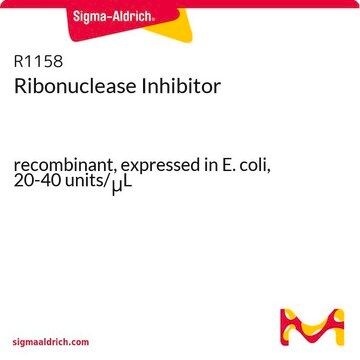R7647
Random Nonamers
for use as primers in cDNA synthesis, 50 μM in H2O
Synonyme(s) :
Oligodeoxynucleotides
Se connecterpour consulter vos tarifs contractuels et ceux de votre entreprise/organisme
About This Item
Code UNSPSC :
41105500
Nomenclature NACRES :
NA.31
Produits recommandés
Qualité
for molecular biology
Forme
liquid
Utilisation
0.1 mL sufficient for 100 RT-PCR reactions
Concentration
50 μM in H2O
Conditions d'expédition
wet ice
Température de stockage
−20°C
Description générale
Random Nonamers are random sequences of nine deoxyribonucleotides (9-mers) used to prime mRNA, with or without a poly(A) tail. Random nonamers may be used as universal, non-specific primers.
Application
Random Nonamers are suitable for:
- First-strand cDNA synthesis
- Preparing cDNA libraries (with oligo (dT) primers
- Prepare labeled DNA probes for hybridizations
Caractéristiques et avantages
- When preparing cDNA libraries or dealing with situations where specific primers are not suitable, the random nonamers can be combined with anchored oligo (dT)23 primers (Product No. O4387).
- In cases of incomplete or missing sequence information, or when specific primers are not effective, the random nonamers offer a solution for cDNA library preparation.
- The random nonamers′ priming capability at higher temperatures (up to 65°C) is reduced, ensuring that they do not interfere with polymerase chain reaction(PCR) following transcription.
- Randomnonamers can also be used to prepare labeled DNA probes for hybridizationstudiesRandom nonamers serve as alternatives to specific reverse transcription (RT) primers for first-strand synthesis, cDNA library construction, and other applications.
Composants
Random Nonamers are provided as a 50 uM solution in water.
Autres remarques
For laboratory use only. Not for drug, household, or other uses.
Produit(s) apparenté(s)
Réf. du produit
Description
Tarif
Code de la classe de stockage
10 - Combustible liquids
Classe de danger pour l'eau (WGK)
WGK 1
Point d'éclair (°F)
Not applicable
Point d'éclair (°C)
Not applicable
Équipement de protection individuelle
Eyeshields, Gloves, type N95 (US)
Certificats d'analyse (COA)
Recherchez un Certificats d'analyse (COA) en saisissant le numéro de lot du produit. Les numéros de lot figurent sur l'étiquette du produit après les mots "Lot" ou "Batch".
Déjà en possession de ce produit ?
Retrouvez la documentation relative aux produits que vous avez récemment achetés dans la Bibliothèque de documents.
Les clients ont également consulté
P Goelet et al.
Proceedings of the National Academy of Sciences of the United States of America, 79(19), 5818-5822 (1982-10-01)
Oligonucleotide primers have been used to generate a cDNA library covering the entire tobacco mosaic virus (TMV) RNA sequence. Analysis of these clones has enabled us to complete the viral RNA sequence and to study its variability within a viral
Sambrook, J., et al.
Molecular Cloning: A Laboratory Manual, 10-10 (1989)
E M Brooks et al.
BioTechniques, 19(5), 806-812 (1995-11-01)
The secondary structure in mRNA is essential for many processes, but it can present a technical problem in making full-length cDNA with reverse transcriptases. Furthermore, different reverse transcriptases have differing abilities to transcribe through regions with secondary structure, which can
Hsiao-Wen Lin et al.
Journal of neurochemistry, 111(3), 808-818 (2009-08-29)
Interleukin-6 (IL-6) is produced by neurons, astrocytes, and microglia, and elevated levels of IL-6 within the CNS have been documented in multiple neurological disorders including Alzheimer's disease, stroke, epilepsy, attention deficit disorder, cerebral palsy, and multiple sclerosis. Here, we sought
Karan J Abraham et al.
Nature, 585(7824), 298-302 (2020-07-17)
Proteins are manufactured by ribosomes-macromolecular complexes of protein and RNA molecules that are assembled within major nuclear compartments called nucleoli1,2. Existing models suggest that RNA polymerases I and III (Pol I and Pol III) are the only enzymes that directly
Notre équipe de scientifiques dispose d'une expérience dans tous les secteurs de la recherche, notamment en sciences de la vie, science des matériaux, synthèse chimique, chromatographie, analyse et dans de nombreux autres domaines..
Contacter notre Service technique












![Enhanced Avian Reverse Transcriptase [eAMV™ RT] For reverse transcription at higher temperatures & rare mRNAs](/deepweb/assets/sigmaaldrich/product/images/496/245/af9bcef6-1474-494b-8fba-32ca0fd56c42/640/af9bcef6-1474-494b-8fba-32ca0fd56c42.jpg)

